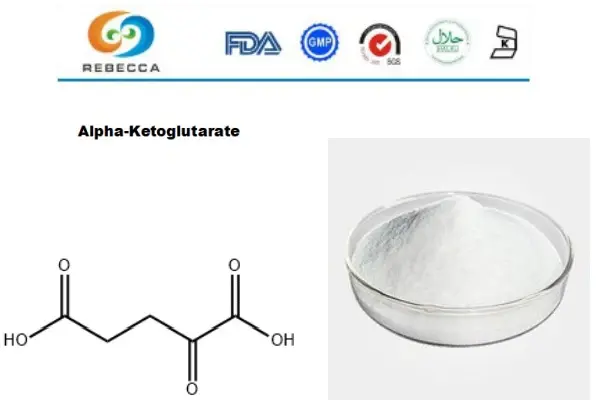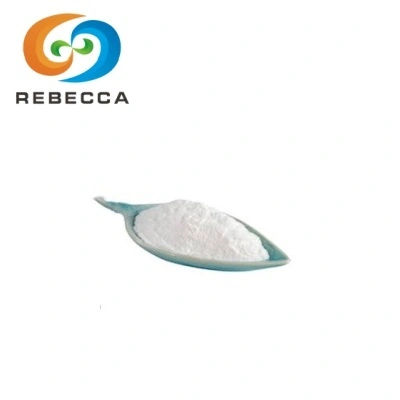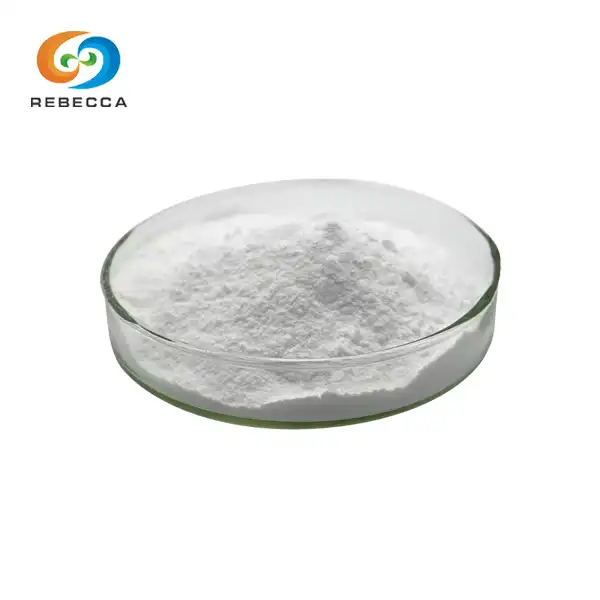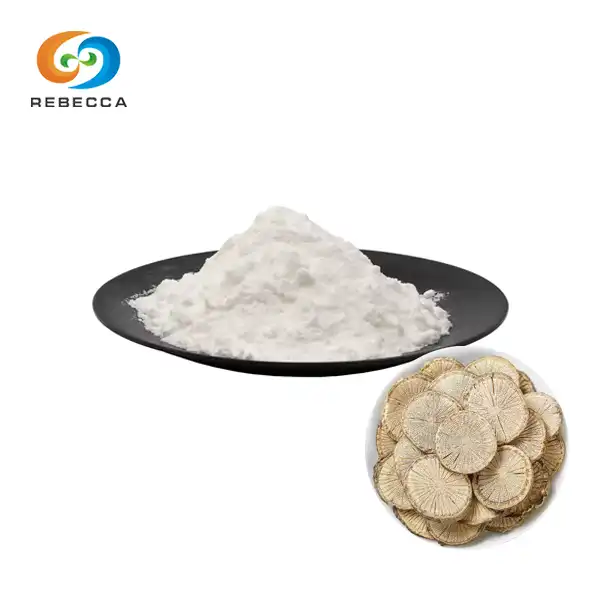Can alpha ketoglutarate entre directly into tca cycle?
Alpha ketoglutarate (AKG) is a crucial metabolite that plays a pivotal role in cellular energy production. To answer the question at hand: Yes, alpha-ketoglutarate can enter directly into the tricarboxylic acid (TCA) cycle. As a key intermediate in this metabolic pathway, AKG serves as a direct entry point, bypassing several steps in the cycle. This unique characteristic makes AKG an efficient fuel source for mitochondrial energy production and a valuable supplement for enhancing cellular metabolism.

【English name】: Alpha-Ketoglutarate
【CAS No.】: 328-50-7
【Molecular Formula】: C5H6O5
【Active ingredients】: Alpha-Ketoglutarate
【Specification】: Alpha-Ketoglutarate 99%
【Appearance】: White to yellowish powder
TCA Cycle Entry Points: A Comprehensive Guide
Key metabolites entering the TCA cycle
The TCA cycle, also known as the Krebs cycle or citric acid cycle, is a central hub of cellular metabolism. It plays a crucial role in energy production and the synthesis of various biomolecules. Several key metabolites can enter this cycle at different points, each contributing to the overall efficiency of energy production.
Acetyl-CoA, derived from the breakdown of carbohydrates, fats, and proteins, is the primary entry point for most metabolites. It combines with oxaloacetate to form citrate, initiating the cycle. Other important entry points include:
- Succinyl-CoA: Derived from odd-chain fatty acids and certain amino acids
- Fumarate: Produced during the urea cycle and purine nucleotide cycle
- Oxaloacetate: Synthesized from pyruvate or aspartate
- Alpha-ketoglutarate: A direct entry point and a key intermediate in the cycle
Direct vs. indirect entry: What's the difference?
Understanding the distinction between direct and indirect entry into the TCA cycle is crucial for grasping the unique role of alpha-ketoglutarate. Direct entry occurs when a metabolite can immediately participate in the cycle without requiring additional conversions. Indirect entry, on the other hand, involves the transformation of molecules into TCA cycle intermediates before they can be utilized.
Alpha-ketoglutarate stands out due to its ability to enter the cycle directly. This means it can be immediately used for energy production without the need for additional enzymatic steps. In contrast, many other molecules must undergo conversion processes before they can contribute to the cycle, potentially limiting their efficiency as energy sources.
Alpha-ketoglutarate: A crucial TCA cycle intermediate
As a direct entry point and key intermediate in the TCA cycle, alpha-ketoglutarate holds a special place in cellular metabolism. Its position in the cycle allows it to influence various metabolic processes, including:
- Energy production through oxidative phosphorylation
- Amino acid synthesis and degradation
- Nitrogen metabolism and ammonia detoxification
- Epigenetic regulation through histone demethylation
The versatility of alpha-ketoglutarate in cellular processes makes it an attractive target for research in fields ranging from sports nutrition to anti-aging studies. Its ability to directly enter the TCA cycle contributes to its potential as a supplement for enhancing metabolic efficiency and overall cellular health.
Alpha-Ketoglutarate's Role in Energy Production
AKG as a direct fuel source for mitochondria
Alpha-ketoglutarate serves as an excellent direct fuel source for mitochondria, the powerhouses of our cells. By entering the TCA cycle without intermediary steps, AKG provides a rapid and efficient means of energy production. This direct entry allows mitochondria to quickly utilize AKG for ATP synthesis, making it an valuable metabolic substrate in high-energy demand situations.
The efficiency of AKG as a mitochondrial fuel source stems from its position in the TCA cycle. As it enters the cycle, it immediately undergoes oxidative decarboxylation, generating NADH and FADH2. These reduced coenzymes then feed into the electron transport chain, driving ATP production through oxidative phosphorylation. This streamlined process highlights the metabolic advantage of AKG over other substrates that require additional conversion steps before entering the energy-producing pathways.

Enhancing ATP production through AKG supplementation
Supplementation with alpha-ketoglutarate has shown promising results in enhancing ATP production and overall energy metabolism. By providing a readily available substrate for the TCA cycle, AKG supplementation can potentially boost mitochondrial function and energy output. This has implications for various physiological processes, including exercise performance, recovery, and cellular repair mechanisms.
Research has demonstrated that AKG supplementation can lead to increased ATP levels in various tissues, particularly under conditions of metabolic stress or high energy demand. For instance, studies in athletes have shown improved endurance and reduced fatigue when supplementing with AKG, likely due to its ability to efficiently fuel mitochondrial energy production.
Alpha-ketoglutarate's impact on cellular metabolism
Beyond its role in energy production, alpha-ketoglutarate exerts a broader impact on cellular metabolism. As a key intermediate in the TCA cycle, AKG serves as a critical junction point for several metabolic pathways. Its availability can influence processes such as:
- Amino acid synthesis and catabolism
- Glucose and fatty acid metabolism
- Collagen synthesis and tissue repair
- Cellular redox balance regulation
Furthermore, AKG acts as a co-substrate for numerous enzymes involved in epigenetic regulation, particularly those responsible for DNA and histone demethylation. This connection between metabolism and epigenetics highlights the far-reaching effects of AKG on cellular function and gene expression, underscoring its potential in areas such as aging research and metabolic health optimization.

Metabolic Flexibility: Direct vs. Indirect TCA Entries
How AKG bypasses rate-limiting steps in metabolism
Alpha-ketoglutarate's ability to enter the TCA cycle directly provides a significant metabolic advantage by bypassing several rate-limiting steps in energy metabolism. Unlike many other metabolites that must undergo multiple conversions before entering the cycle, AKG can immediately participate in energy production. This characteristic allows AKG to circumvent potential bottlenecks in metabolic pathways, enhancing overall metabolic flexibility and efficiency.
By bypassing these rate-limiting steps, AKG can rapidly increase the flux through the TCA cycle, leading to enhanced energy production even under conditions of metabolic stress or high energy demand. This property makes AKG particularly valuable in situations where quick energy mobilization is crucial, such as during intense physical activity or in tissues with high metabolic requirements.

Comparing AKG to other TCA cycle precursors
When comparing alpha-ketoglutarate to other TCA cycle precursors, several key differences emerge. While molecules like acetyl-CoA and oxaloacetate are essential for initiating the cycle, they often require additional steps or conversions before they can fully participate in energy production. AKG, on the other hand, can immediately enter the cycle and contribute to ATP generation.
For instance, glucose, a primary energy source for most cells, must undergo glycolysis and be converted to pyruvate before it can enter the TCA cycle as acetyl-CoA. This multi-step process can be subject to regulatory controls and rate-limiting enzymes. In contrast, AKG's direct entry allows it to bypass these potential limitations, offering a more streamlined path to energy production.

Optimizing metabolic efficiency with alpha-ketoglutarate
The unique properties of alpha-ketoglutarate make it an attractive target for optimizing metabolic efficiency. By providing a direct entry point into the TCA cycle, AKG supplementation can potentially enhance energy production and metabolic flexibility in various physiological contexts. This optimization can have wide-ranging benefits, including:
- Improved exercise performance and recovery
- Enhanced cellular repair and tissue regeneration
- Support for metabolic health and weight management
- Potential anti-aging effects through improved mitochondrial function
Moreover, the role of AKG in epigenetic regulation suggests that its metabolic effects may extend beyond immediate energy production, potentially influencing long-term cellular health and function. As research in this area continues to evolve, the full potential of alpha-ketoglutarate in optimizing metabolic efficiency and overall health is an exciting frontier in nutritional science and metabolic research.
Alpha-ketoglutarate's ability to enter the TCA cycle directly underscores its significance in cellular metabolism and energy production. This unique characteristic allows AKG to serve as an efficient fuel source for mitochondria, bypassing rate-limiting steps and enhancing metabolic flexibility. As research continues to uncover the multifaceted roles of AKG in cellular processes, its potential applications in nutrition, sports performance, and health optimization become increasingly apparent. The direct entry of alpha ketoglutarate into the TCA cycle not only highlights its importance in energy metabolism but also opens new avenues for exploring metabolic enhancement strategies.

Wholesale Alpha Ketoglutarate Supplier
Shaanxi Rebeccia is a leading manufacturer and supplier of high-quality alpha-ketoglutarate. Our production base is equipped with internationally leading extraction, separation, and purification equipment, and operates in strict compliance with GMP and ISO standards. From raw material procurement to finished product delivery, every step undergoes rigorous quality control to ensure the safety and efficacy of our products. We offer alpha ketoglutarate with the following specifications:
- 【Specification】: Alpha-Ketoglutarate 99%
For inquiries about our products, contact us at information@sxrebecca.com.
References
- Krebs, H. A. (1970). The history of the tricarboxylic acid cycle. Perspectives in Biology and Medicine, 14(1), 154-170.
- Owen, O. E., Kalhan, S. C., & Hanson, R. W. (2002). The key role of anaplerosis and cataplerosis for citric acid cycle function. Journal of Biological Chemistry, 277(34), 30409-30412.
- Wu, N., Yang, M., Gaur, U., Xu, H., Yao, Y., & Li, D. (2016). Alpha-Ketoglutarate: Physiological Functions and Applications. Biomolecules & Therapeutics, 24(1), 1-8.
- Shou, J., Chen, P. J., & Xiao, W. H. (2021). The role of α-ketoglutarate in redox regulation. Journal of Zhejiang University-SCIENCE B, 22(3), 181-190.
- Zdzisińska, B., Żurek, A., & Kandefer-Szerszeń, M. (2017). Alpha-Ketoglutarate as a Molecule with Pleiotropic Activity: Well-Known and Novel Possibilities of Therapeutic Use. Archivum Immunologiae et Therapiae Experimentalis, 65(1), 21-36.
- Chin, R. M., Fu, X., Pai, M. Y., Vergnes, L., Hwang, H., Deng, G., ... & Huang, J. (2014). The metabolite α-ketoglutarate extends lifespan by inhibiting ATP synthase and TOR. Nature, 510(7505), 397-401.








